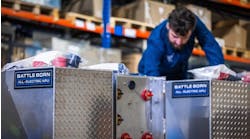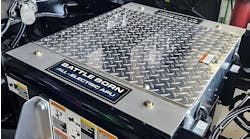I'm involved in technology at all levels within the trucking industry and elsewhere. Some things that I helped pioneer in the mid 80’s, like automated transmissions, have finally reached critical mass in the USA. Others, like predictive cruise control and stability control are still used on a fraction of new vehicles. At the same time, I value the Keep It Seriously Simple (KISS) principle, and, as a consultant, my job is to ask tough, searching questions that get to the heart of the matter.
So, here's the question. What's the best way to improve the shipment of freight both economically from a dollars and cents point of view, and from a sustainability point of view for our environment and living well as humans?
Of course, all the talk is about autonomous vehicles and super cruise control features and platooning. This week some people met and talked about creating an autonomous highway for freight from Canada to Mexico. At the same time, California is building a high speed rail line for passengers. As I travelled along the Columbia River on I-84 yesterday on the start of a vacation trip, I was astounded to see trains with all sorts of rail cars just standing idle. I recall seeing four or more such trains just sitting in the middle of nowhere. I also saw long combination vehicles on the highway with two and three trailers per tractor. I saw chassis containers and bulk containers. I saw reefers piggy backed on rail cars and I saw 27' or 33' trailers piggy backed onto rail cars.
Consider these questions: Which is better for freight efficiency (gallons per ton-mile) and green house gas emissions -- 3 platooning trucks or a long combination vehicle with 3 trailers and two dollies? Which is better--a train with 4 locomotives and 100 empty rail cars or 100 tractor/trailer rigs that have learned how to fill the trailer on a backhaul? Which of the options above is safer in each case? Which is less costly? Which is more reliable? More durable? Easier to manage?
As much as we may have hated deregulation 30 years ago, it did set the trucking industry on a quest for productivity improvements. Some productivity improvements are well known, such as longer combination vehicles. They have been proven to be safer as well. Governments and the public are standing in the way of these improvements. What will it take to improve the rail system in this country for hauling freight. Does a trucking company have to purchase a railroad to get the kind of improvements we need? Would that be considered an anti-trust issue by government authorities rather than a positive benefit to our society?
We need to ship all sorts of freight flexibly from point A to point B. Let's take a fresh look at the best ways to accomplish this using the metrics that are important to both business and society. I'm sure there are ways for everyone to make money and for me to have my cake (from point A) and eat it, too (at point B).


